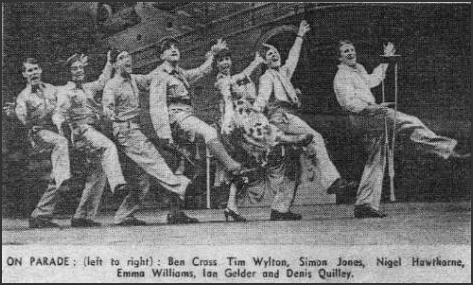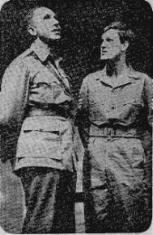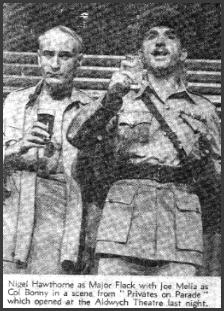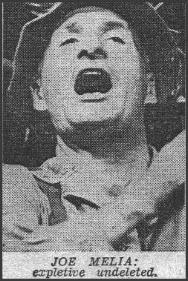












Her privates we
Bernard Levin, The Sunday Times, February 27 1977

AFTER a fallow period, Peter Nichols has returned to the theatre with Privates on Parade (Aldwych), a work which makes it necessary to remind the RSC of the unhappy fate that befell King Midas; with "Wild Oats" and this unprofound but hugely entertaining extravaganza in their repertoire, they would be wise to have everybody concerned vaccinated against hubris. Especially Denis Quilley, of whom more shortly.
"Privates on Parade" chronicles the adventures and presents the performances of an army entertainment troupe around 1950; its members, provided with brevet ranks, are playing Singapore followed by a tour of up-country Malaya during the Emergency. Apart from what is thus applied by the background of the struggle against the terrorists, largely seen through the eyes of a wonderful dotty Major (wonderfully and dottily played by Nigel Hawthorne) who is equally keen on smiting the yellow sons of communist Belial and inviting the chappies home to Berkshire to meet the wife and labradors, the only thing that could be described as a plot contains the play's one disastrous weakness; this is a gruesome two-step, from the weepier shores of Cartlandia, for the clean-living English lad and a local half-and-half unhappily obliged to make a jig-a-jig behind his back with the brutal Sergeant-Major, thus demonstrating, I take it, that two whites do make one Wong.
That's but a trifle here, as is the author's attitude to the political and military struggle, which is roughly that it was a plot by the wicked capitalists to deny the Malayans the pleasures of Communist liberation. But the important thing is that the play is continously funny, in the scenes for the troopers no less than in those for the troopers, the apparently random and shapeless nature of the work offering a balanced mixture of cinyical comment from the squaddies and beautifully-presented concert-party routines (Michael Blakemore directs) from the performers.
The turns include song, dance, comic patter and (a culmination of the lovely study by Simon Jones of what might be called ingratiating deficance) a marvelously bad conjuror; having to complete his act in the dark owing to a power-failure, he bravely assures an audience of unsmiling and Englishness Gurkhas that he is, though invisible, nonetheless producing a string of coloured handkerchiefs from a top hat.
At the same time, the strictly (not quite the exact word, I feel) military side of things is not neglected, and some familiar service jokes present arms. Asked, for instance, to say how he would break the news to a hypothetical Private Farnsbarns that his mother is dead, the bone-headed NCO (Joe Melia) furrows his brow and instructs his imaginery platoon: "All those proposing to visit their old mothers next time their 'ome on leave, one pace forward - where the bloody 'ell do you think you're going Farnsbarns?" But it is particularly when the mummers take to the stage within the stage that uproar knows no bounds; which brings me to Mr Quilley.
Who would have thought that inside this fine and dependable actor there was a sensationally talented drag-artist struggling to get out? For Mr Quilley plays, with immense relish and commensurately hilarious success, an unspeakably outrageous pouf ("You dare to speak to an officer like that and I'll scream the place down") who is, by turns, and among other things, Vera Lynn, Marlene Dietrih and Carmen Miranda, done up in full fig ech time and wringing every deliciously unsavoury double-entendre from lines plentifully supplie therwith. (Mr Quilley and his character as just as good in camp as in, if you see what I mean, camp. "Shaw," he says, rolling his eyes heavenwards: "What a chatterbox!"And his endearing habit of calling all men by female names rises to considerable heights when, after reffering to Clementia Attlee and Georgina the Sixth, he is incited by some mishap to the immortal expletive "Jessica Christ!") There will be great 'emptation, as the run goes on, for Mr Quilley to overdo things even more than the part demands. Let him resist it, remembering Nanny's warning that if the wind changes while you're doing that you'll stay like it.

Falling in for laughs galore
Arthur Thirkell
DANNY LA RUE had better watch out - he is facing hot competition.
Denis Quilley's performance as a high camp drag artist entertaining troups in Malaya is delightfully funny in "Privates On Parade".
Anyone who survived the horros of wartime concerts will laugh himself silly.
Peter Nichol's satire on military buffoonery is a thinking man's "It Ain't Half Hot Mum," telling in a series of sketches the tribulations endured by a squad of peace-time conscripts drafted to concert party duties.
It's not a play without faults though, Nichol's hasn't mustered enough ammunition to hit all the targets on view. Twenty minutes trimmed from its three-hour running time would also sharpen its aim.
The story-line is fairly chaotic, involving comic-strip Army types airing their randy fantasies.
There's a bullying sergeant major in league with the rebels, a newly-arrived recruit in love with a half-caste girl and a dim-witted store-keeper whose conversation is sprinkled with four-letter words.
Predictable types - but just when the play threatens to go off the boil, along comes Quilley with a cabaret turn.
He plays the only professional entertainer in the group; an actor whose gay, outrageous flippancy masks the insecurity of a small-time pro facing a bleak future.
In the army he has a captive audience and is determined to make the most of his brief star status.
He skits on Vera Lynn and Noel Coward are superb pieces of affectionate satire.
Get fell in for an entertaining show.

Khaki comic strips
Milton Shulman
AFTER SERGEANT Bilko, MASH, Dad's Army and literally thousands of films and TV programmes, the comic potentials of the Second World War would seem to have been, thoroughly exhausted.
Yet here comes Privates on Parade by Peter Nichols at the Aldwych to prove that men in uniform
still jack-knife an audience into uproarious laughter and send them shrieking into the night with delight.
What makes these particular soldiers especially risible Is that they are conscripts in Malaya when the
war is over and belong to an Entertainment Unit whose idea of vioience is tugging off false eye-lashes.
Commanded by a well-meaning Christian major who can have thoughts like "singing and dancing is all very well but it won't stop Communist China," the troupe is a collection of homosexuals, male virgins, sadistic ex-policemen, short-sighted suburban boys and thick-heads who qualify every other word with a four-letter obscenity.
Strung together by a loose and ungainly plot about a young recruit who finds sexual satisfaction with a Welsh-Indian girl and some incredibly sinister goings-on about - a corrupt sergeant-major the play successfully weaves in and out of the real action by juxtaposing it against the maudlin, sentimental and patriotic numbers the Unit performs to justify its existence.
Denis Quilley is pairticularly hilarious as a queer Captain whose idea of military dicipline is to Stamp his feet and shriek, "If you' dare speak to an officer like that, I'll scream the place down."
His interpretation of a forces' sweetheart singing lyrics like "When the Shadows creep/Over Fields of Sheep/With a Love that's deep," or Noel Coward asking melodically and crisply to be informed how we lost the war that we won in 1945, are not only archingly funny but remind us of that spirit of dum sentimentality and arch-cynicism that made Britain invincible.
Nigel Hawthorne as a major who believes his men are fighting to preserve a way of' life that guarantees 17th century cottages and a spot of hunting, is the essence of that class whose courage built the Empire and whose fatuousness brought it down.
Joe Melia, as a corporal born with an expletive in his mouth, and Ian Gelder, as the innocent who discovers the facts of life in show business, are others in a delicious cast of natural Army delinquents.
Michael Blakemore's direction organises this diverse and conmplex collection of plot, skits and songs with fluent and witty ease.
Out of a subject that comic writers seem to have battered to death, Peter Nichols has miraculously written an anarchic, ribald and irreverent entertainment that last night had the audience aglow with pleasure.

Camp frolics
FRANK MARCUS, Sunday Telegraph, February 27, 1977
PETER NICHOLS'S scrapbook of memories, Privates on Parade (Aldwych), concentrates on his experiences as a member of the Combined Services Entertainment troupe in Malaya just after the war. The entertainment provided by, that estimab1e branch of the Army may not have been of the first quality, but Mr. Nichols extracts from it three hours of unremitting and uproarious humour.
Indeed the fun i frantic; so much so that one wonders if the author is evading a confrontation with stark reality. Comedy
is, of course, tho last alternative to despair, but we are never allowed to glimpse that despair. Even a military funeral of a comrade supposedle killed by communist terrorists is turned into a song-and-dance act.
The absence of a backbone of true horror - the equivalent, say, of the casualty figures in "Oh, What A Lovely War!" - is my sole criticism of a show which provides an anthology of barrack-room and theatrical wit in all its glorious crudity and irreverence. Only a few moments of tenderness between the new recruit (Ian Gelder), a former teacher and sexual virgin, and the generous, if slightly tarnished dancer who is half Indian and half Welsh (Emma Williams) and who is impregnated
and married by him, escape the clasp of parody. The play might have been sub-titled "Bangers and M.A.S.H."
Occasionally a slight and none-too-convincing plot intrudes but we always return to the dominant music hall routines, to the clever and ribald lyrics and to Dennis King's music. Michael Blakemore, the director, deserves much credit for welding the brilliant but undisciplined material into some sort of unified whole.
The cast is of universal excellence. Denis Quilley scores a personal triumph as the drag queen elevated to the rank of
acting captain. He executes impersonations of Dietrich, Vera Lynn, Carmen Miranda and even Noel Coward,
while never allowing us to forget his tatty origins. Nigel Hawtborne balances him perfectly as the bland Christian major in charge of the outfit, convinced by his deluded notions of archaic, traditional British values. The foulmouthed Corporal (Joe Melia) speaks - or, rather, swears - for the lower classes.
"Privates on Parade" cannot by any stretch of the imagination be regarded as one of Mr. Nichols's most important plays, but it is an immensely enjoyable one. I feel deeply grateful for it.
